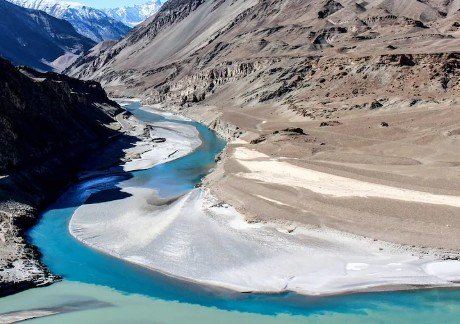
Indus Water Treaty Held in Abeyance: What This Means for Pakistan’s Water Security and Regional Stability
- Breaking NewsHEADLINESNATION
- April 24, 2025
- No Comment
- 7
Saptrishi Soni: The Indus Water Treaty of 1960, a historic water-sharing agreement signed between India and Pakistan under the aegis of the World Bank, has long stood as a rare example of diplomatic stability amid an otherwise strained bilateral relationship. Signed by the then Prime Ministers of both countries, the treaty allocated the waters of the Indus river system—comprising the Indus, Jhelum, Chenab, Ravi, Beas, and Sutlej—between the two nations, ensuring that the three eastern rivers would be under India’s control while the western rivers would flow largely to Pakistan. Over the past six decades, this agreement has not only governed irrigation and power projects but also served as a stabilizing force in the region. However, India’s decision to place the treaty in abeyance has now altered the calculus of South Asian water politics in a decisive way.
The announcement came in the wake of a deadly terrorist attack in Jammu and Kashmir’s Pahalgam, which claimed the lives of over two dozen people, including tourists. In what is being seen as a strategic countermeasure, India has formally notified Pakistan that it will suspend the operation of the treaty until Islamabad takes verifiable and irreversible steps to end its support for cross-border terrorism. This signals a hardening of New Delhi’s position, linking water cooperation with regional security.
The implications for Pakistan are profound and far-reaching. Much of Pakistan’s agrarian economy is dependent on the water that flows from the western rivers—Chenab, Jhelum, and the main Indus—into its territory. The Punjab province, which is not only the country’s agricultural heartland but also home to a majority of its population, is irrigated almost entirely by waters from this river system. With the treaty in abeyance, India is no longer bound by the limitations on how it can construct, operate, or flush its reservoirs along these rivers. This includes projects like Kishanganga and Ratle, which Pakistan has previously contested at international forums.
One immediate concern is the issue of reservoir flushing—a practice critical to desilt Indian hydroelectric dams. Under the treaty, this process was restricted and regulated. With the agreement now suspended, India can undertake flushing operations at will, potentially during Pakistan’s critical sowing seasons. This could reduce water availability downstream during essential agricultural windows, severely impacting crop yields.
Equally pressing is the issue of drinking water. Major urban centers in Pakistan, including Lahore and Rawalpindi, rely heavily on river water not only for agriculture but also for daily consumption. Any significant alteration in the flow or volume of water due to upstream changes could escalate the water stress already being felt due to climate change, population growth, and over-extraction of groundwater.
The decision also halts several procedural obligations of the treaty, such as India’s sharing of flood-related hydrological data with Pakistan. This data, crucial during monsoon seasons when river levels rise dangerously, has helped Pakistan prepare for and mitigate flood disasters in the past. The absence of this data sharing mechanism could now leave Pakistan vulnerable to flash floods and natural calamities with little time for proactive management.
Legally, while the Indus Water Treaty does not contain explicit clauses for unilateral withdrawal, experts point out that Article 62 of the Vienna Convention on the Law of Treaties allows for suspension in the event of a fundamental change in circumstances. India has argued that sustained cross-border terrorism constitutes such a change, necessitating a revision or reevaluation of existing cooperative frameworks.
From the perspective of civil services aspirants preparing for examinations like UPSC, the current developments around the Indus Water Treaty underscore the interconnected nature of diplomacy, international law, environmental policy, and national security. Understanding the historical context of the treaty, its role in regional geopolitics, and the contemporary challenges posed by climate volatility and political tensions is crucial for crafting informed policy perspectives.
This move by India, while strategic in its intent, brings into sharp focus the delicate balance between upholding international agreements and safeguarding national interests. It also opens a new chapter in the South Asian water discourse—one where access to natural resources becomes increasingly entangled with questions of peace, sovereignty, and survival.
#IndusWaterTreaty #IndiaPakistanTensions #UPSC2025 #WaterDiplomacy #Geopolitics
This is an auto web generated news web story and PIc.



